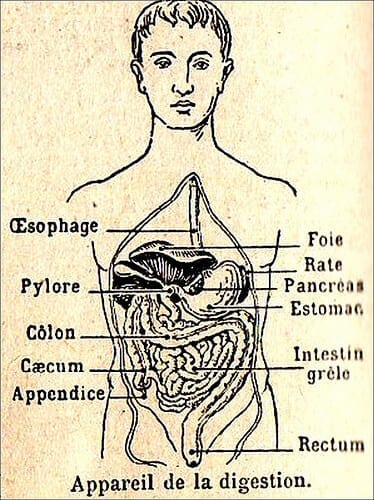Poor digestion can have a big effect on a person’s daily life. From stomach aches to frequent trips to the restroom or having to avoid certain foods, indigestion is something that most everyone is conscious of daily. However, sometimes people suffer from bad indigestion and have no idea of the cause or even the extent of the effect it has on their body. In traditional Chinese medicine, there are several physical symptoms to indigestion that the untrained eye would easily overlook. Knowing what to look for can help reveal the problem and lead to solutions.
A common physical sign of poor digestion is hair and nail health. The quality of hair, skin, and nails directly reflects the quality of a person’s nutrition and their ability to absorb and digest nutrients. Specific traits of the nails or hair can sometimes reveal the digestion problem, but more often than not these signs are not diagnostic in themselves. However, for example, sometimes nail ridges can be a sign of protein deficiency.
The Diagnostic Role of Tongue and Mouth in TCM for Digestive Health
Traditional Chinese medicine (TCM) has used the tongue and mouth as a diagnostic tool for thousands of years. Different sections of the tongue correlate to specific organ systems in the digestive tract. The coating, size, color, and shape of the tongue can each tell a practitioner about the health of the digestive tract. Digestion and absorption in the digestive tract is often linked to blemishes, ulcerations, and the size and color of the blood vessels visible in the tongue.
In their initial diagnosis of a patient, traditional Chinese medicine practitioners will always examine the tongue. There are many clues to the inner workings of the body that are visible on the tongue. A white or yellow coat on the tongue, or a tongue that appears swollen or has a red tip or purple sides can indicate that the patient has a food allergy.
Are you interested in becoming a certified acupuncture professional?
Visit the links below to explore our specialized acupuncture programs at a campus near you:
Nutritional Guidelines and Eating Habits in TCM for Improved Digestion
The belief that a healthy, balanced diet is integral to overall health and well-being is a foundation of TCM. Food can be a form of medicine. TCM holds the belief that not only does it matter what you put into your body, but it also matters how you eat it and how you treat meal times. Eating behavioral patterns can affect digestion as well as the kinds of foods a patient eats. For example, TCM suggests eating while sitting is always better than standing. Chew food thoroughly and really focus on the meal, turn off the TV or other distraction to better accomplish this. Try to avoid eating on the go or while driving or doing other tasks. Don’t skip meals, but instead eat in smaller portions throughout the day. This is beneficial for your digestive system to manage and also has proven metabolism benefits. Additionally, it’s best to eat locally and organically, avoiding any chemicals or processed foods. When hyou eat organic, this naturally lends itself to eating what’s in season, which is also a long-held TCM belief.
However, to best benefit from good nutrition and a healthy diet, the body must be able to properly digest these foods. In addition to poor hair, nail, or skin health, stomach aches, bloating, fatigue, gas, diarrhea and constipation can all be signs of poor digestion. Paying attention to the signs your body is giving you is the first step to solving any imbalance. A TCM practitioner can work with you to devise a diet specifically geared to your individual body’s needs, as well as prescribe and create herbal formulas, or offer an acupuncture treatment, each devised specifically for your ailment. Body awareness and education of common symptoms is important, and the first step to good health.
Featured Posts:

